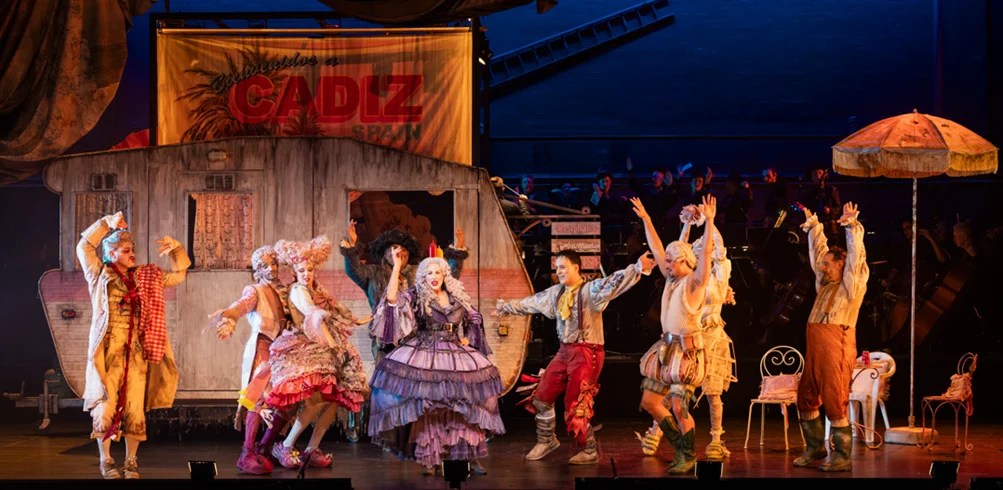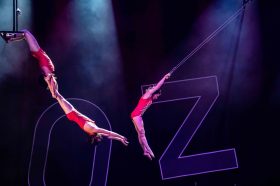With some of the same cast and creatives from the 2024 production in Melbourne, Opera Australia (OA) is presenting Victorian Opera’s latest incarnation of Leonard Bernstein’s Candide. Sitting somewhere between comic operetta and musical theatre, Candide takes the audience on a journey through a somewhat sanitised and accelerated version of Voltaire’s 1759 novella of the same name.
The story, told in words, action and song, follows the misplaced adventures of the eponymous accidental hero, the illegitimate nephew of a Westphalian baron. Naïve and hopeful, Candide is influenced by the teachings of Pangloss, his tutor. Pangloss subscribes to the extreme optimistic thought of philosopher Gottfried Wilhelm Leibniz, and claims that this is the best of all possible worlds. Evicted from the baron’s home for flirting with his daughter, Cunegonde, Candide begins a journey that takes him halfway around the world. The journey tests Pangloss’ sermons though natural disasters, war, unscrupulous persons, murder, mayhem, riches, losses and the meeting of Pangloss’ opposite in the pessimistic Martin.
From the opening notes, the orchestra sets the atmosphere of playfulness and mirth, expertly conducted by Brett Weymark OAM.
The comedy lies in the absurdity of the events, given the touch of sophisticated silliness by a star-studded and talented cast and chorus, directed by the genre crossing Dean Bryant. Eddie Perfect is a perfectly irreverent Voltaire (as the narrator) and also Pangloss. Lyndon Watts, who played Aaron Burr in Hamilton, is a gentle Candide (although at times the mic seems too soft). Annie Aitken reprises her role as Cunegonde (State Opera South Australia/State Theatre Company South Australia 2024) and simply soars.
Aitken as Cunegonde’s aria of inner conflict, ‘Glitter and Be Gay’, takes the audience to exquisite heights and is clearly a crowd favourite. Euan Fistrovic Doidge’s queer Maximilian, brother of Cunegonde, is most entertaining, and the remaining cast contribute strong performances, including Andrew Moran as Martin.
Other stars include the set and costumes by Dann Barber. The idiosyncratic costuming is Versailles meets Steampunk meets Grunge meets waterproof footwear. The excellent and vital Opera Chorus appear cartoonish in their chalk drawn dark suits and multinational array of black headwear.
Centre stage is a battered, grimy, multitasking caravan, variously a home (castle), a stage on a stage, and symbol of travel. As the protagonists move across the globe, a sign is carried across the stage to inform the audience of the name of the land, and these signs accumulate on one side of the caravan like magnets on a fridge. The golden sheep shopping trolleys from El Dorado are just too clever. All this combines to create a comedic apocalyptic atmosphere that conflates the 18th century with the 21st.
There can be unease, however, at staging a story written in and for another time. Voltaire was a key French philosophe of the Enlightenment who valued reason over religion. The sea of folly in his Candide is anchored by a serious critique of fundamentalisms in society, religion and philosophy at that time. Should it be a concern that this gets a bit lost in translation? Of course, creative pieces are often reimagined within different contexts, and Bernstein’s original version was composed during one of a different kind of zealotry, the 1950s communist witch hunts in the US.
Is there a specific context, then, for this Candide? Perhaps clues can be found in both the pastel postapocalyptic ambience and final scene. The cast and chorus join to sing ‘Make Our Garden Grow’ as they fulfill Candide’s vision of simplicity as a way between philosophical extremes. Grow your own garden, take care of the earth. Optimism may be condemned, but there is still room for hope.
Another consideration lies in the sanitisation of the text. The operetta includes a mix of Voltaire’s writing and words, music and lyrics by Bernstein, Richard Wilbur, Hugh Wheeler and others. Many of the more unpalatable aspects of Voltaire’s text have been (rightly) avoided. But should we just forget these existed? Voltaire is not without controversy – despite the scene noting the human cost of Europe’s sugar fetish, Voltaire invested in a company that transported slaves. While he satirised all religions, there is debate over how we should view the racism and antisemitism evident in his works. This latter is only partly assuaged by the fact that Bernstein was himself Jewish.
Read: Theatre review: And Then There Were None, Comedy Theatre
Taken on its own merits, this production of Candide is a wonderful romp through crazy adventures that concurrently highlight the absurdities of extreme ideas – something familiar to us all. The production is polished, the performances stunning, the music delightful. But while we laugh at the bright, colourful antics and soar with the notes, we should not entirely forget Candide’s, and Voltaire’s, shadows.
Candide
Joan Sutherland Theatre, Sydney Opera House
Music by Leonard Bernstein, book by Hugh Wheeler after Voltaire, lyrics by Richard Wilbur, with additional lyrics by Stephen Sondheim, John La Touche, Lillian Hellman, Dorothy Parker and Leonard Bernstein
Conductor: Brett Weymark
Director: Dean Bryant
Set and Costume Designer: Dann Barber
Lighting Designer: Matt Scott
Sound Designer: Samuel Moxham
Choreographer: Freya List
Assistant Director: Miranda Middleton
Cast: Eddie Perfect, Lyndon Watts, Annie Aitken, Dominica Matthews, Euan Fistrovic Doidge, Cathy-Di Zhang, Eddie Muliaumaseali’i, John Longmuir, Andrew Moran
Opera Australia Orchestra
Opera Australia Chorus
Tickets $49-$389
Candide will be performed until 14 March 2025.





